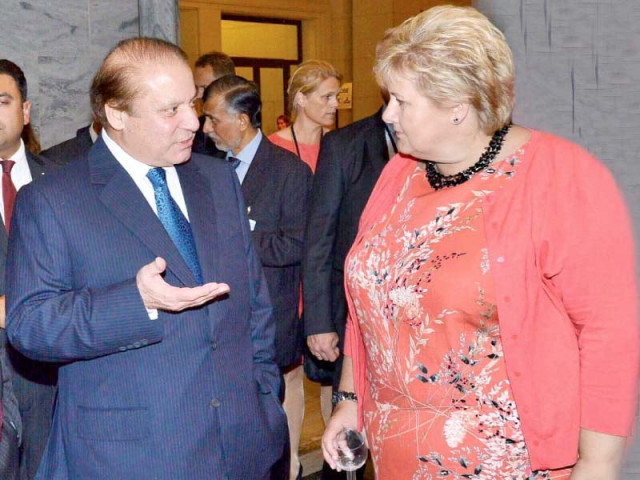Pakistan set to join SCO security bloc
The prime minister will also hold important bilateral meetings on the sidelines of the SCO summit

PM Nawaz exchanges views with his Norwegian counterpart Erna Solberg. PHOTO: PID
PM Nawaz would lead the Pakistani delegation to the meeting of the SCO Heads of States Council (HSC) in Ufa on July 9 and 10, an FO statement issued on Monday said.
Read: Pakistan, India to start process of joining China security bloc
The SCO was founded in Shanghai in 2001 and has China, Russia, Kazakhstan, Kyrgyzstan, Tajikistan and Uzbekistan as member states. The SCO’s HSC is the highest decision-making body in the organisation.
“As an observer state of the SCO, Pakistan has been making substantive contributions to regional peace, security and development,” the FO statement read. On the invitation of the Russian president, the premier will also attend the outreach meeting in Ufa among the leaders of BRICS (Brazil, Russia, India, China and South Africa) forum, SCO member and observer states, Eurasian Economic Union members and Turkmenistan.
The prime minister will also hold important bilateral meetings on the sidelines of the SCO summit. Although the foreign ministry has yet to confirm, PM Nawaz is likely to meet his Indian counterpart Narendra Modi despite a spike in tensions between the two nuclear-armed neighbours.
Meanwhile in Beijing, Chinese Vice-Foreign Minister Cheng Guoping told a news conference that Pakistan and India would start the process of joining the security bloc led by China and Russia.
“As the influence of the SCO’s development has expanded, more and more countries in the region have brought up [their case of] joining the SCO.... India and Pakistan’s admission to the SCO will play an important role in its development and will play a constructive role in pushing for the improvement of their bilateral relations,” the senior Chinese diplomat said.
PM leaves for Norway
Premier Nawaz left on Monday for a three-day official tour of Norway. The prime minister is visiting the Scandinavian country on the invitation of Norwegian Prime Minister Erna Solberg to participate in the Oslo Summit on Education for Development scheduled for July 7. This would be the first official visit by a Pakistani leader to Norway in over a decade.
During this visit, PM Nawaz would address the education summit and interact with several world leaders. He would also hold talks with his Norwegian counterpart and meet Crown Prince Haakon Magnus.
Read: No breakthrough likely as uncertainty mars Pak-India ties
“Pakistan shares the vision of the Oslo summit that aims to mobilise strong and renewed political commitment to reach out to the 58 million children still being denied their right to education, and to improve the quality of education for those who go to school,” said Nawaz.
He said the Pakistani government was determined to improve the quality of education, enhance gender equality and provide increased learning opportunities for both male and female students in Pakistan.
“I strongly believe that education of the youth is the only way forward for socio-economic progress of our future generations, and that eradicating illiteracy is essential for promoting peace, tolerance and harmony in any society.”
Published in The Express Tribune, July 7th, 2015.



















COMMENTS
Comments are moderated and generally will be posted if they are on-topic and not abusive.
For more information, please see our Comments FAQ